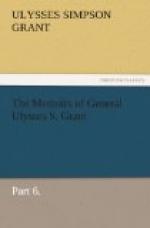Right here I might relate an anecdote of Mr. Lincoln. It was on the occasion of his visit to me just after he had talked with the peace commissioners at Hampton Roads. After a little conversation, he asked me if I had seen that overcoat of Stephens’s. I replied that I had. “Well,” said he, “did you see him take it off?” I said yes. “Well,” said he, “didn’t you think it was the biggest shuck and the littlest ear that ever you did see?” Long afterwards I told this story to the Confederate General J. B. Gordon, at the time a member of the Senate. He repeated it to Stephens, and, as I heard afterwards, Stephens laughed immoderately at the simile of Mr. Lincoln.
The rest of the winter, after the departure of the peace commissioners, passed off quietly and uneventfully, except for two or three little incidents. On one occasion during this period, while I was visiting Washington City for the purpose of conferring with the administration, the enemy’s cavalry under General Wade Hampton, passing our extreme left and then going to the south, got in east of us. Before their presence was known, they had driven off a large number of beef cattle that were grazing in that section. It was a fair capture, and they were sufficiently needed by the Confederates. It was only retaliating for what we had done, sometimes for many weeks at a time, when out of supplies taking what the Confederate army otherwise would have gotten. As appears in this book, on one single occasion we captured five thousand head of cattle which were crossing the Mississippi River near Port Hudson on their way from Texas to supply the Confederate army in the East.
One of the most anxious periods of my experience during the rebellion was the last few weeks before Petersburg. I felt that the situation of the Confederate army was such that they would try to make an escape at the earliest practicable moment, and I was afraid, every morning, that I would awake from my sleep to hear that Lee had gone, and that nothing was left but a picket line. He had his railroad by the way of Danville south, and I was afraid that he was running off his men and all stores and ordnance except such as it would be necessary to carry with him for his immediate defence. I knew he could move much more lightly and more rapidly than I, and that, if he got the start, he would leave me behind so that we would have the same army to fight again farther south and the war might be prolonged another year.
I was led to this fear by the fact that I could not see how it was possible for the Confederates to hold out much longer where they were. There is no doubt that Richmond would have been evacuated much sooner than it was, if it had not been that it was the capital of the so-called Confederacy, and the fact of evacuating the capital would, of course, have had a very demoralizing effect upon the Confederate army. When it was evacuated (as we shall see further on), the Confederacy at once began to crumble




